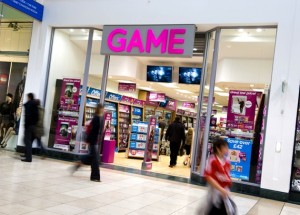“They’re just games.”
“They’re not real.”
“Just download a pirated copy, it’s okay.”
Wrong on all counts I’m afraid.
Gaming is big business and a lot of people depend on the development and sales success of the next big title to come out.
Gone are the days where people can be completely dismissive of the gaming culture, it has a huge impact and is one of the largest industries across the world.
Whether it’s a physical or digital version there a huge number of people involved in the design, development, manufacturing, distribution and sales of these titles.
 Recently we have seen a huge commotion over the survival of GAME through RBS. There was a fair amount of damage done by the difficulties they faced and over 2,000 people lost their jobs. With any luck we’ll see GAME slowly rebuild it’s image and re-establish it’s place in the marketplace without further job loses.
Recently we have seen a huge commotion over the survival of GAME through RBS. There was a fair amount of damage done by the difficulties they faced and over 2,000 people lost their jobs. With any luck we’ll see GAME slowly rebuild it’s image and re-establish it’s place in the marketplace without further job loses.
Currently their gift cards are back up and running but only for pre-owned items in what I’m assuming is a way to try and offload their surplus of second-hand stock. With time I would assume that the gift-cards will be used as normal and I’m also hoping that publishers/distributors will regain trust with the retailer.
It’s a known fact that EA pulling their titles from the shelves of GAME didn’t help matters, but then they’re looking after their own interests and they can’t be blamed for that.
Recently THQ announced job losses along with a number of other studios so everyone is being very wary of how they push forward.
Are we seeing a general shift in the way studios move? It certainly looks like we’ll have a reduction in studios developing for the major platforms and will instead continue to see a faster rise in development for mobile devices. I just hope this doesn’t limit the diversity we get coming through on our major gaming platforms. Mobile apps and games are a big cash cow and studios would be foolish to ignore it. Right now it’s a matter of looking at the books and seeing how to bring money in effectively.
Mobile devices are also an easy platform to distribute on. Previously ‘non-gamer’ types are downloading the latest version of Angry Birds or Cut The Rope because it’s so stupidly accessible and is fantastic for occupying time on devices that everyone now has in their pockets.
Ultimately, gamers want the latest and greatest title to play and compete against our friends with so we try to find the best deals and packages to save ourselves money, but there’s an element out there who think piracy is a good idea.
I appreciate that gamers want lower prices for their titles, but the more that gamers ‘steal’ the more that the prices have to be hiked up to pay the staff behind the scenes. If you had spent an age pouring in your time and resources just for some ignorant git to rip your work off you’d be pretty pissed off. That’s why there’s been so many attempts to get Digital Rights Management (DRM) software right so that publishers can safely distribute their work without fear of any losses. Sadly they haven’t got it right yet. Most of the DRM solutions that accompany PC titles are bloated pieces of code that actually slow the machines down. Great, good work there, but I understand the need for such protection.
Hopefully digital distribution is enabling this minority to get games cheaper by legal means.
At the BAFTAs Gamespot caught up with the creator of Minecraft, Markus “Notch” Persson, who attributes digital distribution as a contributing factor to the downfall of GAME and other retailers on the high-street.
“I think it’s is an unfortunate side effect of digital distribution, and I think digital distribution is saving gaming.”
Do we need more consumers to buy physical copies to help their high-street out? Possibly.
The main reason I don’t is my love for the Steam client. It’s quick, it’s easy, and most importantly it’s usually cheaper.
I think Markus is spot on with how digital is the way forward for gaming, it makes total sense and is why we have Games for Windows LIVE, Origin and services like OnLive appearing.
I’m not sure how the high-street can compete with such digital services and I think all retailers will need to be very creative in how they reinvent themselves to become competitive in the games marketplace.
